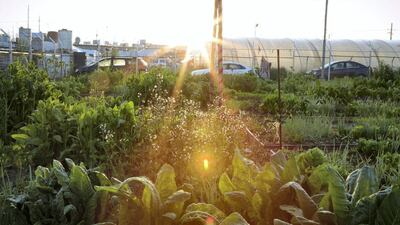Every day, Khokhi Hasso Silo spends hours in her garden tending fruit trees that yield apricots, figs and pomegranates, and watering vegetables that became a vital source of food when a coronavirus lockdown caused shortages in northern Iraq’s refugee camps in early April.
Supply chains have since been restored but the garden distracts her from other worries in Domiz 1, where many have lost their livelihoods since the Kurdish Regional Government closed off refugee camps in the areas of northern Iraq under its control.
“It’s necessary to occupy yourself in order not to be overcome by negative thoughts, so we occupy ourselves with the garden,” Ms Silo, 39, says.
Tomatoes, onions, egpplant and okra from the vegetable patch kept the family going during lockdown, allowing her to prepare Dolma, a popular Kurdish dish made from vegetables stuffed with spiced rice. Freshly picked chives and chopped cucumber provide the base for torshi pickle and a mix of herbs from the garden go into other appetizers that re-create the flavours of home.

Life in Iraq’s largest refugee camp was already difficult, but restrictions imposed to stop the pandemic from reaching the camps have had a devastating impact on vulnerable communities living there.
“The economic effects of this pandemic will be felt for months, if not years to come,” says Jennie Spears from the Lemon Tree Trust, an NGO that supports gardening projects across seven camps in the Kurdistan Region of Iraq.
“We estimate that around 40 per cent of people in Domiz 1 have lost their jobs, with no clear idea of when things may return to normality or if those jobs will become available again.”
Around 32,000 people – mainly Kurdish refugees from northern Syria – live in the camp, squeezed into a space meant for far fewer. Distancing in these close, cramped quarters is almost impossible, with large families confined to small cinder block shelters and in some cases tents.

“We are people who lived in villages and countryside and we used to visit neighbours and relatives a lot, but coronavirus deprived us of this and that was very difficult,” says Ms Silo, who lives with her husband and six children in the camp.
She began cultivating the dusty outdoor patch in 2016 to remind her of the garden she had to leave behind in Sinjar, northern Iraq. It’s since become a source of pride, earning first place in an annual gardening competition run by the Lemon Tree Trust, which promotes the growing of medicinal and edible plants to create a more sustainable environment in the camps.
The trust has been operating in the KRI since 2015, supporting small refugee gardens that bring a glimmer of green life to the cement-coloured streets. Now, many households are relying on their gardens more than ever, growing food and finding comfort in tiny natural worlds they have created from nothing.

Ahmed Ibrahim Ismail started planting his garden a few years ago and now spends several hours a day out there to pass the time during lockdown. The small plot blooms with fig, cypress and pine trees, as well several varieties of rose – his favourite – “each has a different colour,” he says.
Interest in seed and plants has spiralled in the wake of the coronavirus pandemic, prompting the Lemon Tree Trust to launch a successful appeal with UK supplier Mr Fothergill’s to meet mounting demand.
A shipment of 100,000 packets of seed is now on its way to support people in the KRI, following an initial distribution of almost 10,000 packets and 3,000 plants across Domiz 1.
“Home gardening the world over has been a popular way to spend lockdown time and we are so thankful that our systems were already established in the camps,” Ms Spears says.
“The vast majority of people we speak to tell us that their home gardens are their sanctuary – they provide purpose, joy and hope.”
There have not been any confirmed cases of Covid-19 in Domiz 1, but fears of a rapid spread through refugee communities prompted authorities to impose strict lockdowns in early April, shuttering businesses and closing off the camps.
Many international NGOs temporarily stopped work and schools and mosques remain closed.
An initial ‘stay-in-shelter’ lockdown was lifted after 72 hours, but with cases rising in Kurdish cities, authorities have once again sealed off the camps and told people to stay inside.

While many adults are preoccupied with job losses, Hadeya Ezzeldin Ismail is worried about the younger generation. “Covid-19… has a negative impact on children,” she says, pointing to the psychological impacts of the virus and the changes it has brought.
The 38-year-old has been spending five hours a day in her garden during the lockdown – weeding and watering plants, or just sitting with her family, breathing in the scents of mint and parsley from the vegetable patch.
In these unsettling times, the garden brings some comfort - and a little entertainment - to distract from the concerns of camp life, as people prepare for another period of upheaval and brace themselves for the hardship this new uncertainty will bring.


























